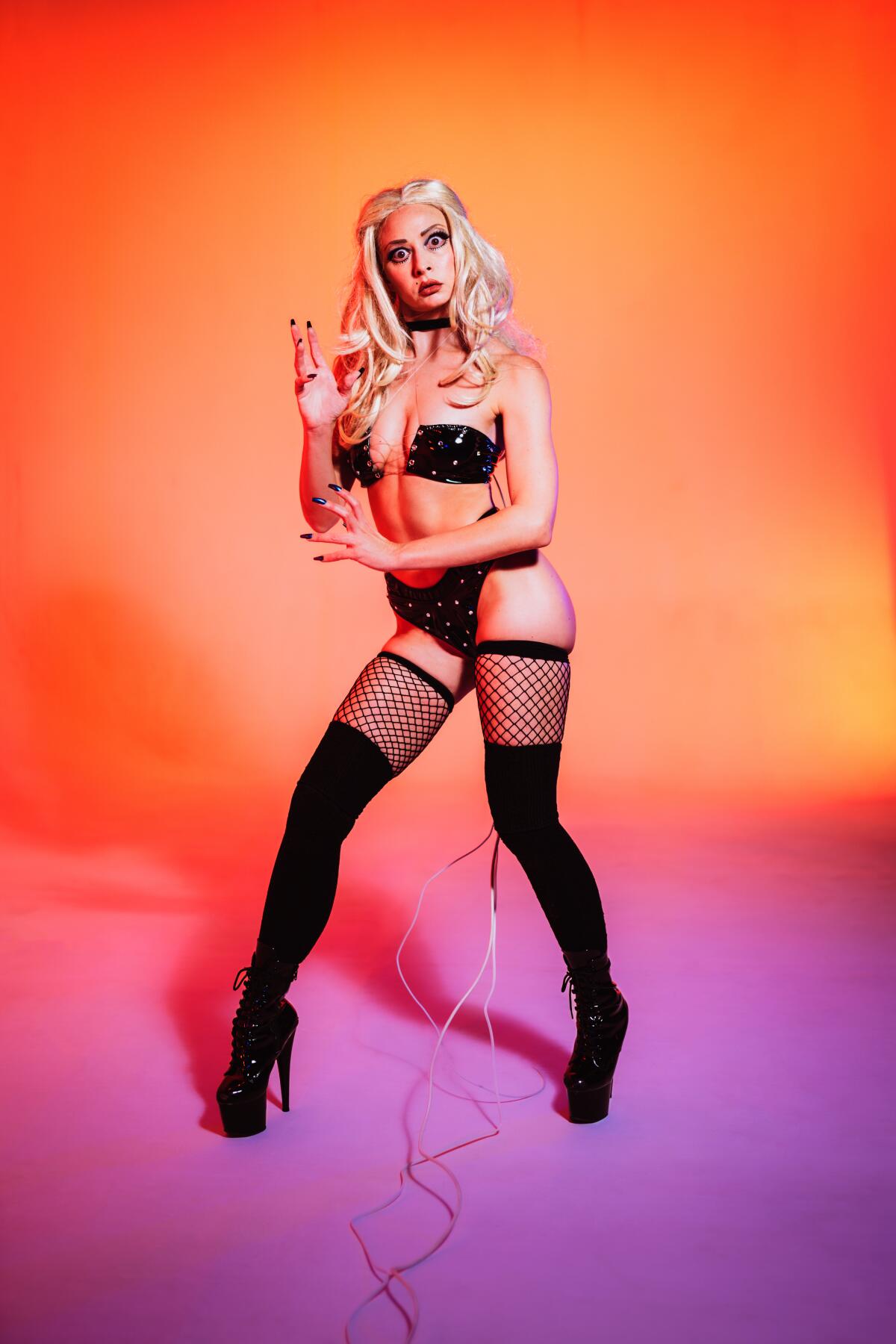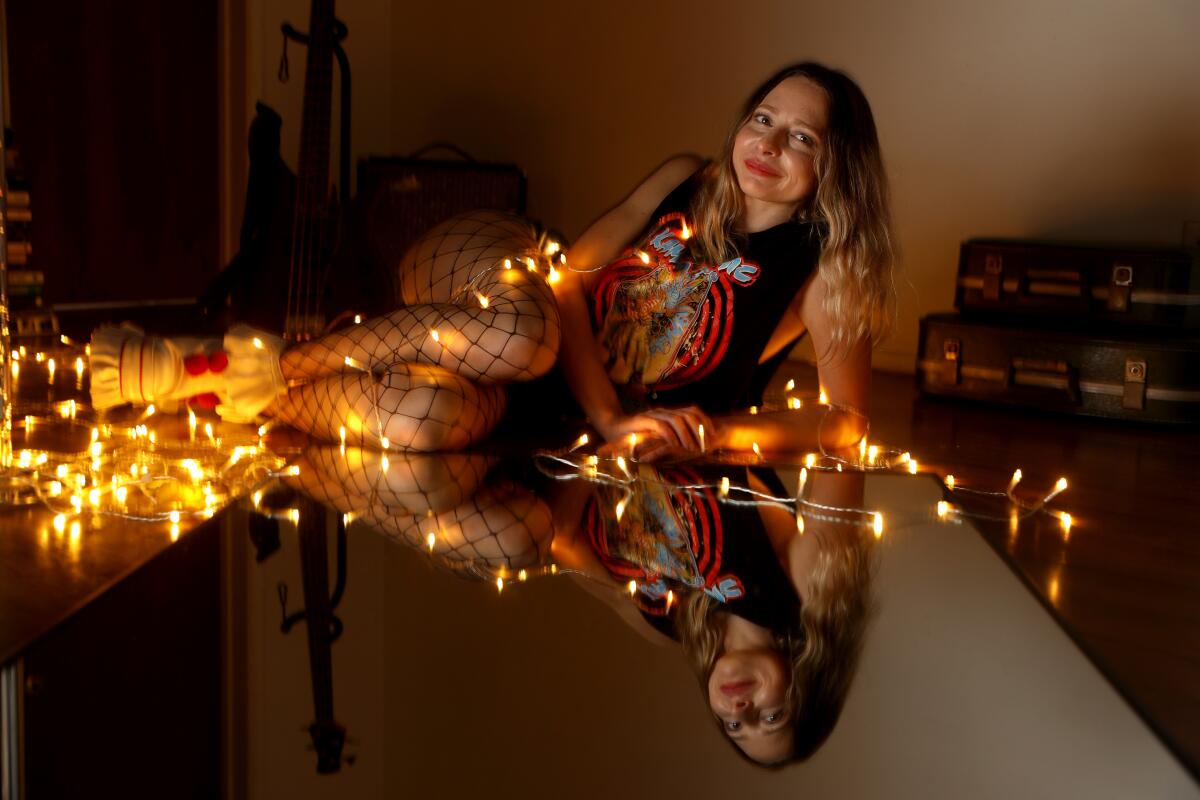Courtney Pauroso’s one-woman sex robot clown show is a live comedy trust fall

- Share via
A leggy blond emerges from a smoke-filled stage, domineering in a black PVC bra, thong, fishnet stockings and 6-inch thigh-high platform boots. The contrabassoon notes of “Also Sprach Zarathustra” from “2001: A Space Odyssey” herald her proclamation: “My name is Vanessa 5,000 and I am here to destroy humanity. Just kidding, I am a sex robot ha ha.” In the opening sequence of Courtney Pauroso’s solo show “Vanessa 5000,” on view in workshop form throughout the spring and summer at L.A.’s Yard and the Elysian theaters, we know from the start that we’re in for a ride. The all-knowing android showcases the “many amazing qualities” that make her “an intelligent purchase for the modern man — aside from the obvious sucking and f—ing.”
And while Vanessa appears to be intimidating and in control, the making of the show, which comes out of the clown comedic tradition, was a vulnerable endeavor of “trusting the unknown” and allowing the piece to “reveal itself” in real time as Pauroso performed it live 17 times over the course of four months. “It’s really scary. Especially when you’re taking big swings,” she said. “If you fail, you’re out there with your d— out. Like, oops.”
She will continue to tweak “Vanessa” while performing it 25 more times at the Edinburgh Fringe Festival throughout August, after which the show will return to L.A. (“unless it’s a total disaster,” she says). Even once the show is firmed up in terms of structure, improvisatory elements will continue to keep the performer on her toes. “I’m always playing the moment. And so I always have to go into this heightened state of presence,” Pauroso said. A heavy dose of audience participation has a similar effect. “It’s a risk that things could go awry. But I think the risk of that helps make it more alive.”

Although Pauroso is alone onstage for most of the performance, there have been many contributors to the piece. After the performances, she encourages people to DM her with ideas or thoughts. Many people have written to her on Instagram, and the performer has used selected suggestions from strangers. “I’ll get feedback from everybody, but you have to know who to listen to,” she said. Artist friends were especially helpful with advice, including fellow clown Kira Nova, magician John Lovick (“Handsome Jack”) and performer Steven Banks (“Billy the Mime”). Most important, Pauroso’s show is directed by longtime friend Corey Podell, with whom she has collaborated since their days performing in the Groundlings’ Sunday Company from 2011 to 2012.
Their enmeshed relationship means the director and the performer end up honing the show “everywhere all the time.” Podell explains, “I don’t know when we’re working on it and when we’re not, and it’s really fun.” Despite the joy of their friendship, however, presenting the show as a work-in-progress in front of an audience can be difficult. “I try to be in good spirits because I think, ‘No one’s making you do a show, dude,’” Pauroso said. “But it’s also really painful and stressful.” New bits may not land, and she has had to manage the failures.
Podell shares the emotional blowback. “When she’s in pain, I’m in pain.” But to Podell, the pain is ultimately essential for the work. “There’s always a crisis season. Or there should be, in order to make the show evolve.”
The provocative elements of this show — stripper attire, carnal dance moves, explicit subject matter, writhing and screaming (the robot has a “goblin mode”), bloody violence (spoiler alert) — are relatively new for Pauroso, who for most of her life saw herself as a “nice lady” and a “good-girl actress.” Pauroso received a BFA from Tulane University and trained at the highly disciplined movement theater Synetic in Washington, D.C. When she left the Groundlings in 2012, she hadn’t yet fulfilled her dreams of becoming a Jodie Foster-type actress, and she didn’t know what was in store for her. “I was not performing. I had such stage fright. I was like, ‘What do I do next?’ I was so terrified and broken,” she said.
In 2016, when she saw clown star Natalie Palamides at the Upright Citizens Brigade theater, Pauroso knew she was seeing something singular. “She was screaming ‘Lock the doors!’ and was taking up so much space. It was so different.” Pauroso was enthralled. “I was like, ‘What is happening? How is she doing this?’ She’s such a force of nature, controlling the energy of the room, and I thought, ‘Whatever that is, I hope I get to do something like that.’”

Palamides suggested that Pauroso study clown (sans the red nose), a form of experimental comedy that has been gaining ground in Los Angeles over the past 10 years, with programs like the Clown School and the Idiot Workshop growing in popularity as alternatives to comedy training centers such as the Groundlings and UCB. Although still a niche technique, this type of work has garnered mainstream buzz in recent years. Amy Poehler produced Palamides’ astonishing special “Nate” for Netflix in 2020, and last year Palamides performed clown with Chelsea and Hillary Clinton on their Apple TV+ show “Gutsy.” Clown also has celebrity fans, including magician Penn Jillette and actors Ben Sinclair and Jason Sudeikis, who all recently attended Pauroso’s shows.
Clown is distinctive for its lack of a fourth wall, meaning performers look at, react to and speak with the audience throughout a performance. It is a highly visual and physical art— elements that are often underutilized in favor of the verbal in other popular styles of live comedy performance such as improv and stand-up. There is generally less language employed and even space for silence. While clown can have loud, out-there, vulgar, shocking and gross-out moments, it also welcomes vulnerability and beauty, often as a balance or counter. As Pauroso explains, “I think I can get away with moments of sincerity or letting people look at me as I am because I’m also disrupting it and looking really stupid.”
Pauroso first studied clown with Phil Burgers, aka Dr. Brown, who directed her first solo show, “Gutterplum,” which she took to Edinburgh in 2019. Burgers helped Pauroso shed her “good girl” persona by reminding her that failing and “being bad” can be a crucial tool in clown. For “Vanessa 5000,” her second swing at a solo show, Pauroso has felt more willing to try and to potentially fail for the sake of seeing what’s possible in the show: “This time my trust muscles are a bit more expanded.”
Throughout the trial and error of workshopping the show, Pauroso’s character “Vanessa” emerged as an in-your-face figure that may not be suitable for all audiences. “In L.A. it’s not so crazy, but I have to remember that what I’m doing could potentially be seen as aggressive or really weird. I want it to be able to work for lots of different kinds of people but also, I have to accept that not everyone is gonna like it,” Pauroso said. She’s uncertain what her family’s reviews will be. “I’m more scared for my parents to see this show than ‘Gutterplum’ because it’s more confrontational. My butt is out the whole time and I’m like, ‘I’m a sex robot, like, f— me,’ you know?”
“Vanessa 5000” talks explicitly about technology’s pervasive role in our lives these days. Pauroso deems the show “a sci-fi horror” and quotes films including “Metropolis,” “Blade Runner” and “The Terminator.” In a vital moment halfway through the performance, Vanessa recites the introduction to Ted Kaczynski’s “The Industrial Society and Its Future,” reminding the audience that technological advancements will destabilize society, make life unfulfilling and subject human beings to indignities that will lead to widespread psychological suffering. For the first time in the show, Vanessa’s bubbly robot voice drops. She begins to question her efficacy and her value as a technological advancement. With a shaky voice, she tries to stay the course, to convince herself of her own worth: “But I am not a bad girl, I am a good girl. I am a shiny beacon of progress, not a symptom of decadence and decay.” The sex robot doth protest too much.

At the start of the show, our hero insists that she has “no desires or preferences.” By the end of the performance, however, our android does have needs. After a frenzied, frenetic breakdown (“You think you can f— me and I won’t f— you back?!”), Vanessa throws off her wig and drops the act. She becomes Courtney. “I’m 38. I have credit card debt. I want a baby.” At first glance, “Vanessa 5000” appears to be a meditation on the contemporary conditions of convenience and ease. It is ultimately a show about a woman admitting that she aches. She’s vulnerable. She’s human.
As she sings in her spare, beautiful cover of Radiohead’s “Fake Plastic Trees,” being “who you wanted/all the time … wears [her] out.” Yes, things can be “perfect”— perfect AI sex, perfect AI script, perfect AI actor. But as Vanessa reminds us, deep down we yearn for the rust. The sad clown mess. “The real thing.”
More to Read
The biggest entertainment stories
Get our big stories about Hollywood, film, television, music, arts, culture and more right in your inbox as soon as they publish.
You may occasionally receive promotional content from the Los Angeles Times.










